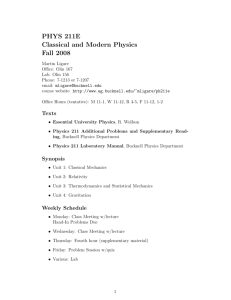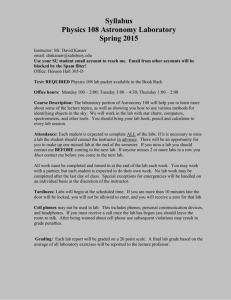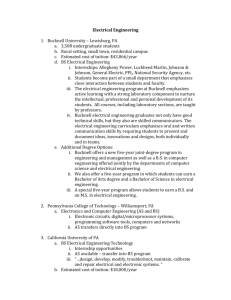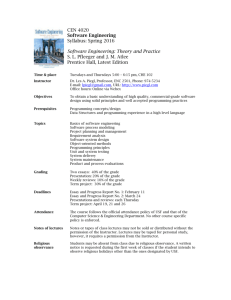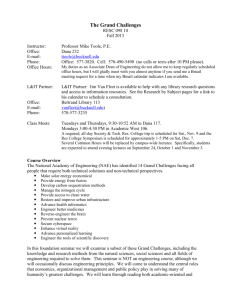Course Information http://www.bucknell.edu/phys211
advertisement
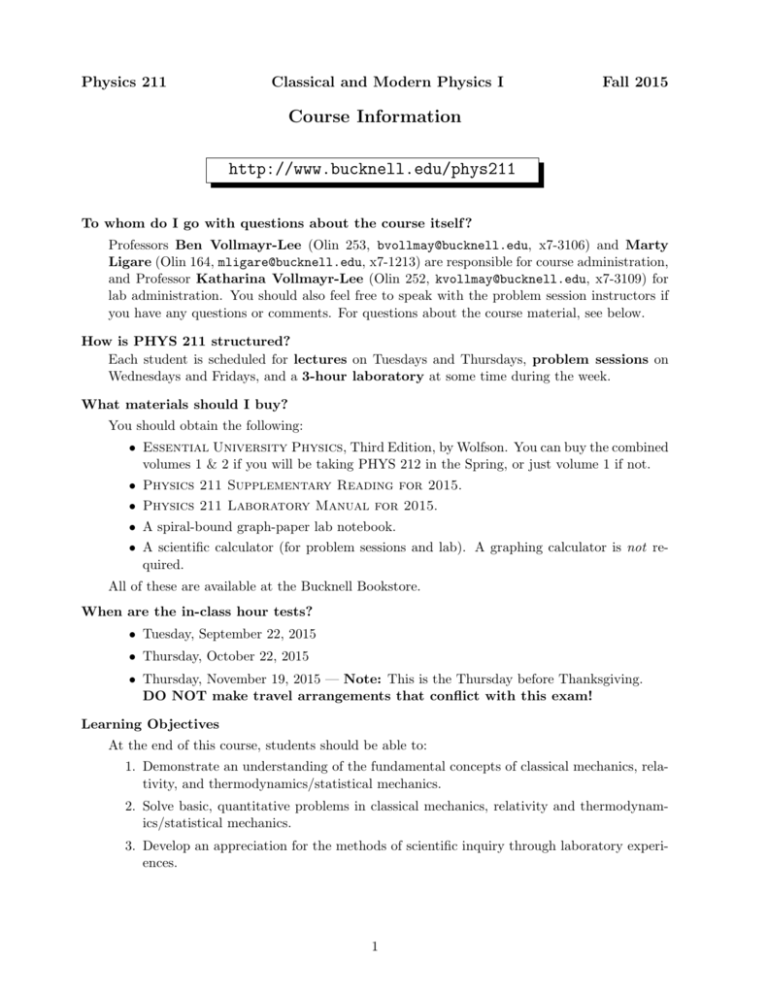
Physics 211 Classical and Modern Physics I Fall 2015 Course Information http://www.bucknell.edu/phys211 To whom do I go with questions about the course itself ? Professors Ben Vollmayr-Lee (Olin 253, bvollmay@bucknell.edu, x7-3106) and Marty Ligare (Olin 164, mligare@bucknell.edu, x7-1213) are responsible for course administration, and Professor Katharina Vollmayr-Lee (Olin 252, kvollmay@bucknell.edu, x7-3109) for lab administration. You should also feel free to speak with the problem session instructors if you have any questions or comments. For questions about the course material, see below. How is PHYS 211 structured? Each student is scheduled for lectures on Tuesdays and Thursdays, problem sessions on Wednesdays and Fridays, and a 3-hour laboratory at some time during the week. What materials should I buy? You should obtain the following: • Essential University Physics, Third Edition, by Wolfson. You can buy the combined volumes 1 & 2 if you will be taking PHYS 212 in the Spring, or just volume 1 if not. • Physics 211 Supplementary Reading for 2015. • Physics 211 Laboratory Manual for 2015. • A spiral-bound graph-paper lab notebook. • A scientific calculator (for problem sessions and lab). A graphing calculator is not required. All of these are available at the Bucknell Bookstore. When are the in-class hour tests? • Tuesday, September 22, 2015 • Thursday, October 22, 2015 • Thursday, November 19, 2015 — Note: This is the Thursday before Thanksgiving. DO NOT make travel arrangements that conflict with this exam! Learning Objectives At the end of this course, students should be able to: 1. Demonstrate an understanding of the fundamental concepts of classical mechanics, relativity, and thermodynamics/statistical mechanics. 2. Solve basic, quantitative problems in classical mechanics, relativity and thermodynamics/statistical mechanics. 3. Develop an appreciation for the methods of scientific inquiry through laboratory experiences. 1 Access Statement Any student who may need an accommodation based on the impact of a disability should contact Professor Vollmayr-Lee or Professor Ligare and also contact Heather Fowler, Director of the Office of Accessibility Resources (hf007@bucknell.edu, x71188), who will help coordinate reasonable accommodations for those students with documented disabilities. What is on the PHYS 211 website? The PHYS 211 website (www.bucknell.edu/phys211) is used extensively in this course. You will take weekly drills and reading quizzes online, and the website also contains the course calendar, announcements, copies of handouts, homework solutions, video examples, and a questions board. You will also be able to access all your scores. What equations will be provided on the hour exams? None, although fundamental constants and physical data will be provided. You may bring into the exam one 3 × 5 index card on which you can write down any relevant equations, along with anything else you wish to write down. To receive full credit for quantitative problems, you must be clear about the method that you are using on the problem, showing relevant sketches and indicating which equations you are using before plugging numbers into them. Any answer that starts with numbers alone will automatically result in significant deductions, even if the answer is correct. You should consider this as you work on assigned and hand-in problems, and develop careful and thorough problem-solving skills. What should I do if I need help with the course material/homework? There are numerous opportunities for you to get help in this course. Some questions can be addressed in lecture; however, in the large group setting it is often impossible to answer your questions in depth. Problem sessions are structured to allow you to ask questions and get help with the assigned problems. However, even problem sessions are not always enough; if you still have questions after problem session, go see any of the problem session instructors during his/her pooled office hours. Additionally, there are help sessions run by upperclass physics students on Wednesdays and Sundays from 8–10 pm in Olin 264. Another option is to join one of the Teaching and Learning Center study groups. This program requires a weekly commitment to meet and work in a small group with a facilitator, and many students have found this regular interaction to be useful. The options discussed above are intended to make sure that everyone has ample opportunity to ask questions and seek help. However, in rare cases there may be a need for additional tutoring. In these cases, a tutor through the Student Learning Support Tutoring Program may be assigned. Contact your problem session instructor if you feel that you need this additional help. Above all else: Don’t give up if you are having difficulties! Our job is to help you learn this material, but we need you to come see us when you need help. Should I take notes in lecture? Frankly, yes. Primarily because taking notes helps you concentrate on the material. But also because some of the questions on the exams will deal with demonstrations or concepts shown or discussed only in lecture. 2 What is expected of me outside of class? We expect that you will spend a significant amount of time outside of class working on PHYS 211. Physics is a challenging subject that will require you to put forth consistent effort, and the course is designed so that there is something for you to do outside of class almost every day: reading to be completed before lectures, problems to be attempted before each problem session, online reading quizzes and drills, and weekly hand-in problems. The Lecture Schedule, Reading Assignments, Problem Assignments, and Learning Objectives will be available throughout the semester on the calendar pages of the course website, and in pdf format in the Handouts section of the website. Below is a detailed list of what you will need to do outside of class. • Complete the reading assignment: The first pass should be done before each of the Tuesday/Thursday lectures. Read the text and study carefully those items listed as “Study” before coming to lecture. This is important because lectures are designed with the assumption that you have done the reading. • Study the day’s objectives: These tell what you should get out of the reading and lectures. • Take the Reading Quiz: Complete the online quiz by 9AM on Thursday before the lecture (better yet: do it Wednesday evening!). You score 2 points if you get 4 or 5 questions right; 1 point for 2 or 3 right. • Complete the weekly Drill set: Following every Tuesday lecture, complete the online Drills before your Wednesday problem session. You score 2 points if you complete the Drill set on time. • Work on the Assigned Problems: You should get as far as possible on each assigned problem before coming to problem session. You may work individually or in groups. You can then use the problem sessions to ask questions about concepts or problems you had difficulty with. • Complete the Hand-In Problems: A full set consists of around 10 problems and must be placed in the drop-box outside Olin 260 (the 211 lab room) no later than 4:30 PM of the due date (typically Monday). No hand-in assignments will be accepted after this time. Don’t ask your friend to hand in your homework for you; if he/she forgets, then you will get a zero. Complete solutions to all the hand-in homework assignments will be posted at the course website. Academic Integrity It is assumed that all students in PHYS 211 will abide by the Bucknell Honor Code. We encourage collaboration during problem sessions, labs, and when working on homework problems, but all work that you hand in must be your own articulation of the solutions to the problems. 3 What’s the attendance policy? Can I make up missed exams, labs, etc.? You are expected to attend all lectures, problem sessions, and labs. We do not give make-up hour exams. If you know ahead of time that you must miss a test for a legitimate reason, and you give us appropriate notice, a resolution can be worked out. You must discuss conflicts in advance with Professor Vollmayr-Lee or Professor Ligare. For lastminute medical issues we will be guided by the Bucknell Medical Excuse Policy, which states the student “must meet significant clinical criteria as judged by a medical professional to warrant missing exams or classes.” In a nutshell, you should visit the Student Health Services right away for an evaluation, and you should also notify your problem session instructor, Professor Vollmayr-Lee, Professor Ligare, or the Physics & Astronomy Department office (x7-1207). If your fitness for taking an exam is in question you should resolve the question before the start of the exam — completed exam scores will stand. If you must miss your regular lab session, you must arrange with your lab instructor ahead of time to make up the lab. If this is not possible (e.g., last-minute emergencies or if you oversleep), you must in every case contact your lab instructor as soon as possible. Waiting to contact your instructor until your next week’s lab is too late, since if a make-up lab is permitted, it will usually occur during the same week as the session you missed. Each lab not made up will result in 1/3 of a letter grade deduction from your final grade! (A to A−, . . . , C− to D, D to F). It is possible to fail this course if you have too many labs that are not made up. If you must miss a Friday quiz, your first option is to attend another problem session section on the same day. You must discuss the conflict with your problem session instructor in advance, and also contact the instructor of the session you’ll be visiting ahead of time, as many sections are quite full. For any other situation, you must discuss the conflict with your problem session instructor ahead of time. Note: We keep only your 8 highest quiz scores. How will I be evaluated? Over the course of the semester, you will be able to earn up to a total of 730 points, distributed as follows: 100 points for each of 3 in-class tests 120 points for a comprehensive final exam 60 points for a lab final, given in the same 3-hour period as the comprehensive final 80 points for your 8 highest weekly hand-in homework assignments 60 points for 12 laboratory sessions. NOTE: You must complete all 12 labs. Incomplete labs will result in deductions from your final course grade (see attendance policy above). 30 points for group problem-solving exercises done 3 times in problem session 40 points for your 8 highest quizzes, given Fridays at the end of your problem session 40 points for online drills and reading quizzes How do I know my letter grade? We do not associate letter grades with individual exams or assignments; rather the final course grade is based solely on the total score earned by the end of the course. Although the exact matching of total scores with final letter grades is not pre-determined, a total of 90%, 80%, 70% or 60% will ensure at least an A−, B−, C− or D, respectively (assuming all 12 labs are completed). 4
